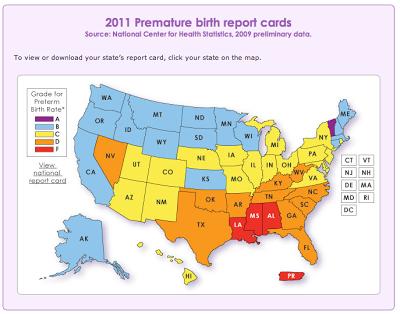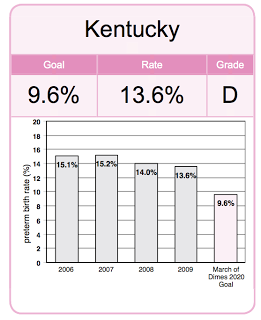Health News
 Giving birth to a baby before it has been brought to full term has become less common in the U.S. and Kentucky, but the nation still only received a C, and the state a D, in the 2011 Premature Birth Report Cards compiled by the March of Dimes. Each year, nearly half a million babies are born prematurely.
Giving birth to a baby before it has been brought to full term has become less common in the U.S. and Kentucky, but the nation still only received a C, and the state a D, in the 2011 Premature Birth Report Cards compiled by the March of Dimes. Each year, nearly half a million babies are born prematurely.

- Fewer Ky. Teens Are Having Sex, And More Teens Are Using Birth Control When They Do; Teen Birth Rates Are At An All-time Low
By Melissa Patrick Kentucky Health News Fewer teens are having sex now than did in the last generation, and of those that do, more are using some form of birth-control, according to a new report from the Centers for Disease Control and Prevention. The Kentucky...
- Kentucky Doctor Honored For Her Work In Bolstering Health And Preventing Deaths Of Babies Born A Few Weeks Early
A Kentucky neonatalogist was honored this week for giving the state "a role in catalyzing a national movement around healthier babies." Ruth Ann Shepherd, M.D., division director for maternal and child health in the Kentucky Department for Public Health,...
- Infant Mortality, Pre-term Birth, Teenage Pregnancy, Children Living In Smokers' Homes All Drop Even As As Child Poverty Goes Up
Nationwide, the rates of infants who die, babies who are born prematurely, teens who are having babies, and the percentage of young children who live in a home where someone smokes have all decreased in the last five years. But the percentage of kids...
- Mothers Should Try To Go To Full Term In Their Pregnancies, But Many Are Unaware Of The Risks Of Early Delivery, Uk Study Finds
Illustration by Michelle Kumata via KRTBabies who are born before the full term of 40 weeks may have health problems later in life, since important brain development takes place in the very last stages of pregnancy. As such, mothers should try to avoid...
- Home Births Increase, Mostly In Rural Areas
Home birth is making a resurgence in the U.S., reports Shari Roan of the Los Angeles Times. It used to be commonplace in rural areas where doctors were few and transportation wasn't easy. As those factors faded, mothers chose hospitals over bedrooms,...
Health News
Ky. premature births declining, but still above national average
 Giving birth to a baby before it has been brought to full term has become less common in the U.S. and Kentucky, but the nation still only received a C, and the state a D, in the 2011 Premature Birth Report Cards compiled by the March of Dimes. Each year, nearly half a million babies are born prematurely.
Giving birth to a baby before it has been brought to full term has become less common in the U.S. and Kentucky, but the nation still only received a C, and the state a D, in the 2011 Premature Birth Report Cards compiled by the March of Dimes. Each year, nearly half a million babies are born prematurely.In Kentucky, 13.6 percent of women gave birth to babies prematurely in 2009, down by 0.4 percentage points over 2008. Only Vermont was given an A, with a pre-term birth rate of 9.3 percent, reports Bonnie Rochman of Time Healthland. Three states and Puerto Rico got Fs; 19 got Cs and 11, as well as the District of Columbia, got a D.
Data from 2006 to 2009 were analyzed. In 2009, the preliminary preterm birth rate was 12.2 percent, compared to 12.8 percent in 2006. The March of Dimes wants that number to drop to 9.6 percent by 2020. Pre-term birth is the leading cause of newborn death in the U.S.
The study analyzed three factors that can contribute to pre-term birth, including the percentage of uninsured women in each state and the percentage of women who smoke. Late pre-term birth, which occurs when a baby is born between 34 to 36 weeks gestation, was also considered, as it "has been linked to rising rates of early induction of labor and C-sections," the study says.

In Kentucky, the percentage of uninsured women has remained the same at 22.8 percent from 2006 to 2009. The smoking rate has dropped from 30.5 percent to 27.3 percent, as has the late pre-term birth rate, down to 9.7 percent from 10.2 percent. (For other states, click on the map above, then click on the state in the larger image.)
The pre-term birth rate was calculated by looking at the percentage of all live births in which the babies had reached 37 weeks gestation or less.
March of Dimes President Dr. Jennifer Howse called the study results positive, "given that for the past 30 years, the rate of preterm birth has been increasing."
"It's not a lot, and the rate is still too high, but the good news is some things are starting to work," she said. (Read more)
- Fewer Ky. Teens Are Having Sex, And More Teens Are Using Birth Control When They Do; Teen Birth Rates Are At An All-time Low
By Melissa Patrick Kentucky Health News Fewer teens are having sex now than did in the last generation, and of those that do, more are using some form of birth-control, according to a new report from the Centers for Disease Control and Prevention. The Kentucky...
- Kentucky Doctor Honored For Her Work In Bolstering Health And Preventing Deaths Of Babies Born A Few Weeks Early
A Kentucky neonatalogist was honored this week for giving the state "a role in catalyzing a national movement around healthier babies." Ruth Ann Shepherd, M.D., division director for maternal and child health in the Kentucky Department for Public Health,...
- Infant Mortality, Pre-term Birth, Teenage Pregnancy, Children Living In Smokers' Homes All Drop Even As As Child Poverty Goes Up
Nationwide, the rates of infants who die, babies who are born prematurely, teens who are having babies, and the percentage of young children who live in a home where someone smokes have all decreased in the last five years. But the percentage of kids...
- Mothers Should Try To Go To Full Term In Their Pregnancies, But Many Are Unaware Of The Risks Of Early Delivery, Uk Study Finds
Illustration by Michelle Kumata via KRTBabies who are born before the full term of 40 weeks may have health problems later in life, since important brain development takes place in the very last stages of pregnancy. As such, mothers should try to avoid...
- Home Births Increase, Mostly In Rural Areas
Home birth is making a resurgence in the U.S., reports Shari Roan of the Los Angeles Times. It used to be commonplace in rural areas where doctors were few and transportation wasn't easy. As those factors faded, mothers chose hospitals over bedrooms,...
